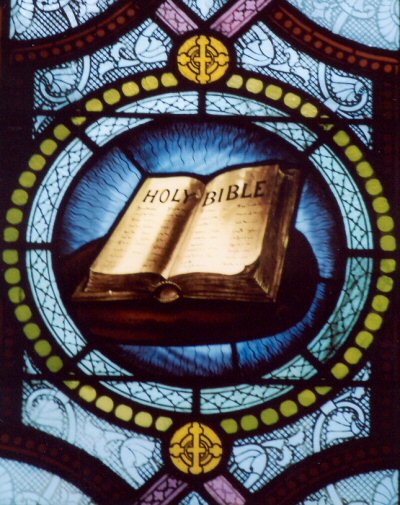 Liturgy
of the Word
Liturgy
of the WordSolemnity of Our Lord
Jesus Christ the King
November 20, 2011, Cycle A
White priestly vestments symbolize purity and integrity of the
life of faith.
Home Page
Liturgical
Cycles A 10-11
Introductory Acts Of Worship
The Entrance Prayers:
On Sunday, usually a hymn praising God
is sung in place of reciting a Psalm from the Bible which invites us to
enter more deeply into the mystery of God's love for us. The recited
weekday Psalm expresses a youthful heart and spirit, delighted that we may come
before the living God.
Entrance Song
/ Entrance Psalm (Antiphon)
Entrance Song
Revelation 5:12; 1:6 The
Lamb who was slain is worthy to receive strength and divinity, wisdom and power
and honor: to him be glory and power for ever.
The Priest Approaches and Kisses the Altar: The altar is a symbol of Christ. In it are cut five crosses to recall the five wounds of Christ. The altar also represents the Church and has embedded in it the relics of her saints. The priest comes to the altar to celebrate the Sacrifice in the Church's name. Because of the glory surrounding the altar upon which the divine Sacrifice will be made, the kiss of the priest unites the Church to Christ, its Redeemer.
Priest:
In the name of the Father, and of the Son, and of the Holy Spirit.
All:
Amen.
The Greeting: We are welcomed in God's name. Our response unites us to our neighbor, to the priest and to God. (The priest may select from several forms of greeting).
Priest: The Lord
be with you.
All:
And also with you.
The Penitential Prayers:
We recognize our guilt for past sins,
express our sorrow for them, and ask that Mary, the angels, the saints, and our
brothers and sisters in Christ pray for the Lord God's mercy. (The priest
may select from several forms).
Priest: My brothers and sisters, to prepare ourselves to celebrate the sacred mysteries, let us call to mind our sins.
Priest: You raise the dead to
life in the Spirit: Lord, have mercy.
All: Lord, have mercy.
Priest: You bring pardon and peace to the sinner: Christ, have mercy.
All: Christ, have mercy.
Priest: You bring light to those in darkness:
Lord, have mercy.
All: Lord, Christ, have mercy.
The Absolution:
Priest: May almighty God have
mercy on us, forgive us our sins, and bring us to everlasting life.
All:
Amen.
The Gloria: The Glory of God prayers have existed from the second century. They repeat the angels praise of God which heralded the birth of Christ on earth. Our praise is lifted again through the years as we rejoice at His coming as Lord, God, the most high Jesus Christ, who at Christmas took on our human nature while at the same time being the son of Man. This ancient hymn expresses our recognition of God's glory and love. It calls upon Christ as our holy and divine mediator, and the Holy Spirit who forever binds us together in God's love.
The Opening Prayer: The priest lifts the united prayers and petitions of the congregation to God the Father through the merits of Jesus Christ in the Holy Spirit.
Priest: Almighty and merciful God, you break the power of evil
and make all things new in your Son Jesus Christ, the King of the universe.
May all in heaven and earth acclaim your glory and never cease to praise you.
We ask this through our Lord Jesus Christ, your Son, who lives and reigns with
you and the Holy Spirit, one God,
for ever and ever.
 Liturgy
of the Word
Liturgy
of the Word
Christ is made known to us through the Old Testament which prepares us to recognize Him. In those days, God inspired men who spoke His message. Now, the New Testament Gospel reading announces His presence to us directly through His Son. Both readings bring God's message to us. Our responsibility is to respond.
The First Reading: From the Old Testament Book of the prophet Ezekiel
Ezekiel 34:11-12, 15-17
Thus says the Lord God: I myself will look after and tend my sheep. As a shepherd tends his flock when he finds himself among his scattered sheep, so will I tend my sheep. I will rescue them from every place where they were scattered when it was cloudy and dark. I myself will pasture my sheep; I myself will give them rest, says the Lord God.
The lost I will seek out, the strayed I will bring back, the injured I will bind up, the sick I will heal, but the sleek and the strong I will destroy, shepherding them rightly. As for you, my sheep, says the Lord God, I will judge between one sheep and another, between rams and goats.
Priest/Reader:
The Word of the
Lord.
All:
Thanks
be to God.
The Responsorial Psalm: This Psalm praising God, is a prayer to God, or recommends the practice of virtue. It is sung as an interlude between the scriptural readings. It provides yet another instructional setting and invites the assembly to imitate the cantor who sings a repeated response to the verses of an ancient Psalm many of which are attributed to King David. The verses are sung first by a cantor (song leader) accompanied by instruments, the refrain is sung by the people.
Psalm 23:1-2, 2-3, 5-6
Cantor: The Lord is my shepherd; there is nothing I shall want.
All: The Lord is my
shepherd; there is nothing I shall want.
Cantor: The Lord is my shepherd; I shall not want. In verdant
pastures he gives me repose.
All: The Lord is my
shepherd; there is nothing I shall want.
Cantor: Beside restful waters he leads me; he refreshes my soul. He
guides me in right paths for his name’s sake.
All: The Lord is my
shepherd; there is nothing I shall want.
Cantor: You spread the table before me in the sight of my foes; you
anoint my head with oil; my cup overflows.
All: The Lord is my shepherd; there is nothing I shall want.
Cantor: Only goodness and kindness follow me all the days of
my life; and I shall dwell in the house of the Lord for years to come.
All: The Lord is my shepherd; there is
nothing I shall want.
The Second Reading: Taken from the New Testament, often from a letter written by St. Paul.
Second Reading: 1 Corinthians 15:20-26, 28
Brothers and sisters: Christ has been raised from the dead, the firstfruits of those who have fallen asleep. For since death came through man, the resurrection of the dead came also through man. For just as in Adam all die, so too in Christ shall all be brought to life, but each one in proper order: Christ the firstfruits; then, at his coming, those who belong to Christ; then comes the end, when he hands over the kingdom to his God and Father, when he has destroyed every sovereignty and every authority and power. For he must reign until he has put all his enemies under his feet. The last enemy to be destroyed is death. When everything is subjected to him, then the Son himself will also be subjected to the one who subjected everything to him, so that God may be all in all.
The Alleluia: An ancient expression of joy anticipating the Lord's message we will hear in the Gospel.
Mark 11:10
Cantor: Alleluia!
Alleluia! Alleluia!
All: Alleluia!
Alleluia! Alleluia!
Cantor: Blessed is he who inherits the kingdom of David
our father; blessed is he who comes in the name of the Lord.
All: Alleluia!
Alleluia! Alleluia!
The Gospel:
The Liturgy of the Word is completed
by the reading of the Gospel. Before its reading, the members of the
assembly trace the sign of the cross upon the forehead to indicate their mental
acceptance of the Truth, on the lips to indicate their readiness to announce it,
and over the heart to indicate their sincere desire to accept it into their
lives. The "Good News" of the Gospel tells that God's kingdom has come for
all to hear, accept, and announce to the world for its salvation. It is God
who is
speaking to us. Christ comes to teach us by the example of His life
and by His own words.
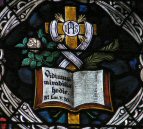 Priest: Cleanse my heart and my lips, almighty God, that I may worthily proclaim your
holy Gospel. Through the words of the Gospel may our sins be wiped away.
Priest: Cleanse my heart and my lips, almighty God, that I may worthily proclaim your
holy Gospel. Through the words of the Gospel may our sins be wiped away.
Priest: The Lord be with you.
All: And
also with you.
Priest/Deacon: A
reading from the holy Gospel according
to Matthew.
All: Glory
to you, Lord.
The Gospel: Matthew 25:31-46
Matthew wrote to show that Christ
was the
Messiah and fulfilled the Jewish prophecies.

Jesus said to his disciples: “When the Son of Man comes in his glory, and all the angels with him, he will sit upon his glorious throne, all the nations will be assembled before him. And he will separate them one from another, as a shepherd separates the sheep from the goats. He will place the sheep on his right and the goats on his left. Then the king will say to those on his right, ‘Come, you who are blessed by my Father. Inherit the kingdom prepared for you from the foundation of the world. For I was hungry and you gave me food, I was thirsty and you gave me drink a stranger and you welcomed me, naked and you clothed me, ill and you cared for me, in prison and you visited me.’ Then the righteous will answer him and say, ‘Lord, when did we see you hungry and feed you, or thirsty and give you drink? When did we see you a stranger and welcome you, or naked and clothe you? When did we see you ill or in prison, and visit you?’ And the king will say to them in reply, ‘Amen, I say to you, whatever you did for one of the least brothers of mine, you did for me.’ Then he will say to those on his left, ‘Depart from me, you accursed, into the eternal fire prepared for the devil and his angels. For I was hungry and you gave me no food, I was thirsty and you gave me no drink, a stranger and you gave me no welcome, naked and you gave me no clothing, ill and in prison, and you did not care for me.’ Then they will answer and say, ‘Lord, when did we see you hungry or thirst or a stranger or naked or ill or in prison, and not minister to your needs?’ He will answer them, ‘Amen, I say to you, what you did not do for one of these least ones, you did not do for me’ And these will go off to eternal punishment, but the righteous to eternal life.”
Priest/Deacon: The Gospel of the Lord.
All: Praise
to you, Lord Jesus Christ.
The Priest's Sermon:
The priest develops, explains, and comments upon the Master's words,
so our minds may be
enlightened, and our
hearts enriched.
(A priestly reflection upon this Gospel)
Profession of Faith: We state in the Nicene Creed the principles of our faith in precise and definite terms.
All: We believe in one God, the Father, the Almighty, maker of heaven and earth, of all that is seen and unseen. We believe in one Lord, Jesus Christ, the only Son of God, eternally begotten of the Father, God from God, Light from Light, true God from true God, begotten, not made, one in Being with the Father. Through him all things were made. For us men and for our salvation he came down from heaven: by the power of the Holy Spirit he was born of the Virgin Mary, and became man. For our sake he was crucified under Pontius Pilate; he suffered, died, and was buried. On the third day he rose again in fulfillment of the Scriptures; he ascended into heaven and is seated at the right hand of the Father. He will come again in glory to judge the living and the dead, and his kingdom will have no end. We believe in the Holy Spirit, the Lord, the giver of life, who proceeds from the Father and the son. With the Father and the Son he is worshipped and glorified. He has spoken through the Prophets. We believe in one holy catholic and apostolic Church. We acknowledge one baptism for the forgiveness of sins. We look for the resurrection of the dead, and the life of the world to come. Amen.
General Intercessions: We pray for the needs of the pope, civic leaders, our own needs, those of others, the sick, the dying, those who have died, the church, and the world. The response of all to each intercession: Lord, hear our prayer.
All: Lord,
hear our prayer.
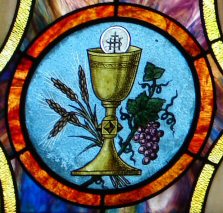 The Liturgy of the Eucharist
The Liturgy of the Eucharist
Gifts of bread and wine symbolizing ourselves are presented to the priest who will offer them to God the Father. Through the Holy Spirit, they will become the Body and Blood of Jesus Christ whom we receive in Holy Communion. Jesus unites Himself with us for our spiritual nourishment and strength. Today, when individuals do not present their own personal offerings of bread and wine, the monetary contribution symbolizes the material of their united sacrifice. The priest makes and offering of the bread and wine to God.
Preparation of the Bread and Wine:
Priest: Blessed are you, Lord, God of all creation, through your goodness we have
this bread to offer, which earth has
given and human hands have made. It will become for us the bread of life.
All:
Blessed be God for ever.
Priest: By
the mystery of this water and wine may we come to share in the divinity of
Christ, who humbled himself to
share
in our humanity.
Priest: Blessed are you, Lord God of all creation, for through your goodness we have
received the wine we offer you; fruit
of the vine and work of human hands it will become our spiritual drink.
All: Blessed be God for ever.
Priest: Lord God, we ask you to receive us and be pleased with the sacrifice we offer you with humble and contrite hearts.
The Priest's Hands are Washed: This act was traditionally necessary because the priest handled the various gifts presented by the people. Now, the cleansing act using water reminds the priest and ourselves of the need to cleanse not only the hands but the soul. Soon, the priest's hands will hold the actual body of Christ, and we will become His dwelling place.
Priest: Lord,
wash away my iniquity; cleans me from my sin.
Pray, brethren, that
my sacrifice and yours may be acceptable to God, the almighty Father.
All: May the Lord accept the sacrifice at your hands, for the praise and glory of his
name, for our good, and the good
of all his holy Church.
Prayer over the Gifts: Speaking in our name, the priest asks the Father to accept the gifts we offer through him.
Priest: Lord, we offer you the sacrifice by which your son reconciles mankind. May it bring unity and peace to the world. We ask this through Christ our Lord.
Eucharistic Prayer:
(Number Two: The priest may select from several forms).
Priest: The Lord be with you.
All: And also with you.
Priest: Lift up your hearts.
All: We lift them up to the Lord.
Priest: Let us give thanks to the Lord, our God.
All: It is right to
give him thanks and praise.
Preface Prayer:
Father, all-powerful and ever-living God, we do well always and everywhere to give you thanks. You anointed Jesus Christ, your only Son, with the oil of gladness, as the eternal priest and universal king. As priest he offered his life on the altar of the cross and redeemed the human race by this one perfect sacrifice of peace. As king he claims dominion over all creation, that he may present to you, his almighty Father, an eternal and universal kingdom: a kingdom of truth and life, a kingdom of holiness and grace, a kingdom of justice, love, and peace. And so, with all the choirs of angels in heaven we proclaim your glory and join in their unending hymn of praise:
Priest
and All:
Holy, Holy, Holy Lord, God of power and might, Heaven and
earth are full of your glory. Hosanna in the
highest. Blessed
is he who comes
in the name of the Lord. Hosanna in the highest.
Priest: Lord, you are holy indeed, the fountain of all
holiness. Let your Spirit come upon these gifts to make them holy, so that
they may become for us the body and blood of our Lord, Jesus Christ.
The priest repeats the words which
Christ used at his Last Supper when He changed the bread into His Body and the
wine into His Blood. His Body and Blood are truly present but under the
appearance of bread and wine. The death of Christ is prolonged in each of
those who receive Him worthily. We apply His death to ourselves so that we
may share His glory. This moment is the most solemn on earth because it is
Divine act which enables us to apply to ourselves the Cross which Christ
willingly took upon Himself.
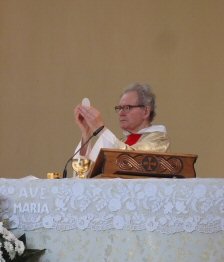 We are called to die to sin and
lift our very selves to God so that we become changed; to do as God would have
us do, to become what God would have us become. Our own little cross can
lift us into union with Christ's Cross so we may earn the joys of everlasting
happiness with God the Father.
We are called to die to sin and
lift our very selves to God so that we become changed; to do as God would have
us do, to become what God would have us become. Our own little cross can
lift us into union with Christ's Cross so we may earn the joys of everlasting
happiness with God the Father.
The Lord's Supper: Before he was given up to death, a death he freely accepted, he took bread and gave you thanks. He broke the bread, gave it to his disciples, and said:
Take this, all of you and eat of it: this is my Body which will be given up for you.
When
supper was ended, He took the cup. Again he gave you thanks and praise,
gave the cup to his disciples, and said:
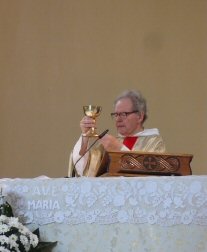 Take this, all of you, and drink from it; for this is the chalice of my
Blood, the Blood of the new and eternal covenant. It will be shed for you
and for all so that sins may be forgiven. Do this in memory of me.
Take this, all of you, and drink from it; for this is the chalice of my
Blood, the Blood of the new and eternal covenant. It will be shed for you
and for all so that sins may be forgiven. Do this in memory of me.
Memorial Acclamation: (The priest may
select from several forms).
Priest: Let us proclaim the mystery of faith:
Priest
and All: Lord, by
your cross and resurrection you have set us free. You are the Savior of
the world.
Memorial Prayer: (The
priest may select from several forms).
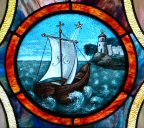 Priest:
Recalling Christ's Passion, Resurrection, Ascension, the Church,
the dead, and ourselves.
Priest:
Recalling Christ's Passion, Resurrection, Ascension, the Church,
the dead, and ourselves.
In memory of His death and resurrection, we offer you, Father, this
life-giving bread, this saving cup. We thank you for counting us worthy to
stand in your presence and serve you. May all of us who share in the body
and blood of Christ be brought together in unity by the Holy Spirit. Lord,
remember your Church throughout the world; make us grow in love, together with
_____ our Pope, _____ our bishop, and all the clergy. Remember our
brothers and sisters who have gone to their rest in the hope of rising again;
bring them and all the departed into the light of your presence. Have
mercy on us all; make us worthy to share eternal life with Mary, the virgin
Mother of God, with the apostles, and with all the saints who have done your
will throughout the ages. May we praise you in union with them, and give
you glory through your Son, Jesus Christ.
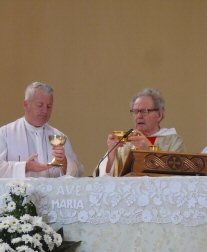 Through whom you continue to create all these good things, O Lord; you
make them holy, fill them with life, bless them, and bestow them upon us. bestow
them upon us.
Through whom you continue to create all these good things, O Lord; you
make them holy, fill them with life, bless them, and bestow them upon us. bestow
them upon us.
Doxology:
Prayer of Praise: Through
him, with him, and in him, in the unity of the Holy Spirit, all glory and honor
is yours, almighty Father, for ever and ever.
All: Amen.
Communion Rite
In the Liturgy of the Eucharist, we symbolically offer ourselves to the Lord through the gifts of bread and wine. At the Consecration, we offer our very lives to be united the God the Father through the Cross of Christ. In Communion, we find that we have not died at all, but have come to life. We have surrendered ourselves to God through His Divine Son, Jesus Christ. In return become ennobled and enriched. We give up time and we get eternity, we give up our sin and we receive grace, we surrender our self-will and receive the strength of the Divine Will, we give up ourselves and we receive everything. For the Son of God says to us that unless we receive Him we shall not have Divine life in us. But it is not really we who receive Christ as it is Christ who receives us, bringing us into Himself.
God makes His Cross the very means of our salvation and our life. While we have crucified Him, His eternal love cannot be extinguished. Christ willed to give us the very life we crucified in our Redemption, the Consecration of Holy Thursday into Communion, His death into our everlasting life.
The Lord's Prayer:
Priest:
Let us ask our Father to forgive our sins and to bring us to forgive those
who sin against us.
Priest and
All: Our
Father, who art in heaven, hallowed be they name; Thy kingdom come; Thy will be
done on earth as it is in
heaven. Give us this
day our daily bread; and forgive us our trespasses as we forgive those who
trespass against us; and lead us not into temptation, but deliver us from evil.
Priest: Deliver us, Lord, from every evil, and grant us peace in our day. In your mercy keep us free from sin and protect us from all anxiety as we wait in joyful hope for the coming of our Savior, Jesus Christ.
All: For the kingdom, the power and the glory are yours, now and for ever.
Prayer for Peace:
Priest: Lord Jesus Christ, you said to your apostles,
peace I leave you, my peace I give you, look not on our sins, but on the faith
of your Church, and graciously grant the peace and unity of your kingdom where
you live for ever and ever.
All: Amen.
Priest: The peace of the Lord be with you always.
All: And with your spirit.
Priest: Let us offer each other the sign of peace.
Breaking of the Bread:
Priest and All: Lamb of God, you take away the sins of the
world, have mercy on us.
Lamb of God, you take away the sins of the world, have mercy on us.
Lamb of God, you take away the sins of the world, grant us peace.
Priest: May this mingling of
the Body and Blood of our Lord Jesus Christ bring eternal life to us who receive
it.
Communion of the Priest:
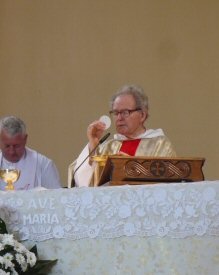 Priestly Preparation: Lord Jesus Christ, Son of the living God, who by the will of the Father and the
work of the Holy Spirit, through
your death gave life to the world; free me by this your most holy Body and Blood
from all my sins and from every evil; keep me always faithful to your commandments, and never let me be
parted from you.
Priestly Preparation: Lord Jesus Christ, Son of the living God, who by the will of the Father and the
work of the Holy Spirit, through
your death gave life to the world; free me by this your most holy Body and Blood
from all my sins and from every evil; keep me always faithful to your commandments, and never let me be
parted from you.
Priest: This is the Lamb of God who takes away the sins of the world. Happy are those who are called to his supper.
Priest and All: Lord, I am not worthy to receive you, but only say the word and I shall be healed.
Priest: May the Body of Christ keep me safe for eternal life.
May the Blood of Christ keep me safe for eternal life.
Communion Antiphon:
Communion Song: Psalm 28:10-11
The Lord will reign for ever and will give his people the gift of peace.
Communion of the Faithful:
Priest:
The Body of Christ.
The Faithful: Amen.
Priest:
The Blood of Christ.
The Faithful: Amen.
Cleansing of the Vessels:
Priest: Lord, may I receive these gifts in purity of heart. May they bring me healing and strength, now and for ever.
Prayer after Communion:
Priest: Let us pray.
Priest: Lord,
you give us Christ, the King of all creation, as food for everlasting life.
Help us to live by his gospel and bring us to the joy of his kingdom, where he
lives and reigns for ever and ever.
Concluding Rite (The priest may select from several forms)
Greeting:
Priest: The Lord be with you.
All: And also with you.
Blessing:
Priest: Bow your heads and let us pray for God's blessing.
Priest: Lord, have mercy on your people. Grant us in
this life the good things that lead to the everlasting life you prepare for us.
We ask this through Christ our Lord.
Priest: May almighty God bless you, the Father, and the Son,
and the Holy Spirit.
All: Amen.
Dismissal Prayer:
Priest: Go in the peace of Christ.
All:
Thanks be to God.
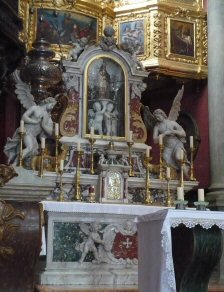 O my Jesus, forgive us our sins.
O my Jesus, forgive us our sins.
Save us from the fires of hell.
Lead all souls to heaven,
especially those in most need of your mercy.
www.Divinemasterplanforlife.com
www.Saintsnheaven.com
Top
Home Page
Liturgical
Cycles A 10-11